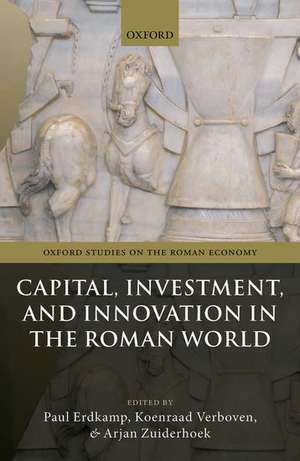Capital, Investment, and Innovation in the Roman World: Oxford Studies on the Roman Economy
Editat de Paul Erdkamp, Koenraad Verboven, Arjan Zuiderhoeken Limba Engleză Hardback – 18 feb 2020
Din seria Oxford Studies on the Roman Economy
- 5%
 Preț: 241.61 lei
Preț: 241.61 lei - 17%
 Preț: 704.40 lei
Preț: 704.40 lei - 30%
 Preț: 506.81 lei
Preț: 506.81 lei - 12%
 Preț: 308.21 lei
Preț: 308.21 lei - 17%
 Preț: 194.81 lei
Preț: 194.81 lei - 30%
 Preț: 751.05 lei
Preț: 751.05 lei - 13%
 Preț: 260.35 lei
Preț: 260.35 lei - 30%
 Preț: 852.01 lei
Preț: 852.01 lei - 25%
 Preț: 809.21 lei
Preț: 809.21 lei - 30%
 Preț: 601.39 lei
Preț: 601.39 lei - 30%
 Preț: 881.02 lei
Preț: 881.02 lei - 12%
 Preț: 277.43 lei
Preț: 277.43 lei - 27%
 Preț: 864.60 lei
Preț: 864.60 lei - 30%
 Preț: 604.98 lei
Preț: 604.98 lei - 30%
 Preț: 705.33 lei
Preț: 705.33 lei - 17%
 Preț: 703.40 lei
Preț: 703.40 lei - 17%
 Preț: 854.93 lei
Preț: 854.93 lei
Preț: 841.23 lei
Preț vechi: 1118.19 lei
-25% Nou
Puncte Express: 1262
Preț estimativ în valută:
160.99€ • 166.31$ • 133.98£
160.99€ • 166.31$ • 133.98£
Carte tipărită la comandă
Livrare economică 15-21 martie
Preluare comenzi: 021 569.72.76
Specificații
ISBN-13: 9780198841845
ISBN-10: 0198841841
Pagini: 508
Ilustrații: 53 black-and-white illustrations
Dimensiuni: 164 x 241 x 30 mm
Greutate: 1.02 kg
Editura: OUP OXFORD
Colecția OUP Oxford
Seria Oxford Studies on the Roman Economy
Locul publicării:Oxford, United Kingdom
ISBN-10: 0198841841
Pagini: 508
Ilustrații: 53 black-and-white illustrations
Dimensiuni: 164 x 241 x 30 mm
Greutate: 1.02 kg
Editura: OUP OXFORD
Colecția OUP Oxford
Seria Oxford Studies on the Roman Economy
Locul publicării:Oxford, United Kingdom
Recenzii
Overall, the volume convinces with excellent and informative contributions, which cannot all be addressed individually. The always very broad perception of different types of sources is to be commended. The book also impresses with very good illustrations as well as useful graphics, tables and appendices.
Overall, the editors present us with excellent studies and an important starting point for further explorations into capital goods and investment in the Roman world.
This book is a stimulating contribution to the debate on the economic history of antiquity, casting diverse perspectives on the issues of investment, capital, and innovation and on their interdependence. It should not be missing in any library on the economic history of antiquity and will certainly stimulate a myriad of further theoretical and empirical studies on the many questions raised.
Overall, the editors present us with excellent studies and an important starting point for further explorations into capital goods and investment in the Roman world.
This book is a stimulating contribution to the debate on the economic history of antiquity, casting diverse perspectives on the issues of investment, capital, and innovation and on their interdependence. It should not be missing in any library on the economic history of antiquity and will certainly stimulate a myriad of further theoretical and empirical studies on the many questions raised.
Notă biografică
Paul Erdkamp is Professor of Ancient History at the Vrije Universiteit Brussel, where he has taught since 2007. He studied history at the Radboud University of Nijmegen, obtaining his PhD in 1998, before holding teaching posts at the universities of Edinburgh, Utrecht, and Nijmegen and a research fellowship at Leiden University. He is co-director with Koenraad Verboven of the Roman Society Research Centre (Ghent/Brussels) and general editor of the Palgrave Studies in Ancient Economies series, and has published widely on the Roman economy, the Roman army, and Roman Republican historiography.Koenraad Verboven is Professor of Ancient History at Ghent University, where he has taught since 2007. He specializes in ancient social and economic history, particularly of the Roman world, and has a special interest in monetary history and numismatics, friendship and patronage based networks, guilds (collegia), (neo-)institutional analysis, and complexity economics. He is the author of The Economy of Friends: Economic Aspects of Amicitia and Patronage in the Late Republic (Peeters, 2002), for which he was awarded the 'Prix Joseph Gantrelle' of the Belgian Royal Academy.Arjan Zuiderhoek is Professor of Ancient History at Ghent University, where he has taught since 2008. He studied Greek and Roman history at the University of Groningen and the University of Cambridge and obtained his PhD at the University of Groningen in 2006 before taking up positions as Junior Research Fellow and Director of Studies in Classics at Homerton College, University of Cambridge and, subsequently, Postdoctoral Research Fellow at Ghent University. He is the author of The Politics of Munificence in the Roman Empire: Citizens, Elites and Benefactors in Asia Minor (CUP, 2009) and The Ancient City (CUP, 2017).
